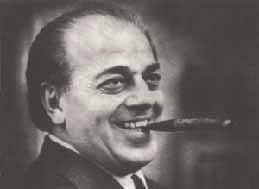
Stands out as the most creative composer in 20th century Brazil. His revolutionary musical style consisted of a combination of European styles and Brazilian nationalistic music. He was a world renowned art musician and his musical career served as inspiration to subsequent art composers.
Villa-Lobos, born in Rio in 1887 was raised in a middle class family. His father Raul Villa-Lobos was an employee of the National Library and a non professional musician. Villa-Lobos’s father had a huge influence on his musical education and ensured that he took the discipline involved in music very seriously. He learned to play the cello from his father, he was also an avid guitar player.
In 1899 after the death of his father Villa-Lobos absorbed himself in the life of the Rio’s street musician as a guitar player. Villa-Lobos, after completing his formal education at the monastery of S Bento in Rio, toyed with the idea of entering the school of medicine. This idea was swiftly abandoned for his aspirations and love of the variety of nationalistic Brazilian musical styles. In his early years he earned his living playing the cello in hotels and in the Odeon cinema.
From 1913 to 1936 Villa-Lobos was married to pianist Lucilia Guimares. She was very supportive of his career and gave premieres of several of his piano pieces especially during the “Week of Modern Art in 1922.After their separation he became involved with Arminda Neves d’Almeida. His musical activity and creativity grew of the years and by 1917 he had produced some 100 works. This was inclusive of chamber music, string quartets, guitar pieces and two symphonies. During the 1922 “Week of Modern Art” in Sao Paulo Villa-Lobos was noted as the representative of modern music and many of his chamber works were performed.
His musical career included travel to Europe in 1923, where he settled in Paris. Henceforth his international acclaim. He met with several infamous composers, including Stranvinsky. He also had great success at concert performances in Paris, and his music began to be published by Max Eschig. Villa-Lobos attained unparalleled accreditation in Paris when compared to other Latin American composer.
On his return to Brazil Villa-_Lobos made political attempts at improving musical education in schools, this became a nationwide campaign of his for many years. He became known as the patriach of musical learning in Brazil. In 1942 the government founded a National Conservatory of Orpheonic singing with Villa-Lobos as director. The last decade of his life was complicated by bladder cancer, despite his ailing health he remained active touring internationally. He later retired in 1957, after six decades of artistic works he finally succumbed to the complications of cancer in 1959. His funeral was attended by the country’s then president.
Source: Grove music online, Retrieved October 17 2009
No comments:
Post a Comment